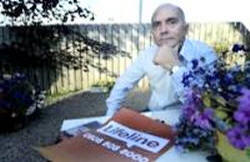
This week Jenny Monroe talks to Gerard Preshur
 GERARD
Preshur, 54, from Lisburn is a Schools Counsellor for
Contact Youth. This organisation was established in 1977 and
is Northern Ireland's regional Headquarters Voluntary
Organisation for the provision of counselling services for
young people. Gerard worked for the Health Service before
taking ill with a heart condition. When he recovered he
decided to train as a Counsellor so he could put his life
experiences to good use.
GERARD
Preshur, 54, from Lisburn is a Schools Counsellor for
Contact Youth. This organisation was established in 1977 and
is Northern Ireland's regional Headquarters Voluntary
Organisation for the provision of counselling services for
young people. Gerard worked for the Health Service before
taking ill with a heart condition. When he recovered he
decided to train as a Counsellor so he could put his life
experiences to good use.
During term time I work four days a week in four schools across Lisburn and once a week I work for the Criminal Justice System.
I wake up at 6.45am and get ready to take my dog for a walk. Then I have breakfast. When the schools are closed I go by train to Contact Youth's head office in Belfast. Otherwise I walk to the school I am based in that particular day and meet with the Pastoral Carer. I provide face to face counselling to young people in the post primary school settings and also - through Contact Youth's Suicide Prevention - 24/7 free telephone counselling service.
Counselling in schools is a specialist activity and a rapidly developing part of the schools' pastoral care network. The successful completion of school life can add to a smooth transition from school to adult life. School not only allows for the acquisition of general skills that can be applied to new learning but for raising self esteem, self efficacy, social maturity and competency.
Young people, much like adults, can be impacted by difficult and stressful situations in different ways and can find it difficult to cope at times. It is important that young people can access support services in the place where they spend so much of their day. I have had traumatic times in my life and I can relate to some of the issues my clients have. I had heart problems in my forties and I never thought I would be able to work again so doing this job makes me feel as if I am doing something positive with my life.
A box similar to a post box, with Contact Youth's logo on it, is placed in the schools and the young people can write their name and year on a piece of paper and put it in the box. Then I put together an appointment schedule and the individuals are discreetly given a time to see me.
Successful counselling is based on trust, self-motivation and commitment. Individual sessions for young people vary on the needs of the young person and the schools' timetabling structure. A session normally last 40-50 minutes. Some people only need one session while others require a of more. It just depends on the indivdual.
Young people talk to me for a variety of reasons. Some examples include relationship problems, domestic violence, bereavement, family conflict r breakdown, unable to sleep, stress, anxiety, bullying or having difficulty at school/work. others may be self-harming or using drugs.
Sometimes there may seem to be no obvious reason for the feelings a young person is experiencing. Counselling may help them to understand what they think, feel and do, weigh their alternatives and options or make their own decisions and act upon them.
Skills can be developed through counselling which are transferable to academic life and enable pupils to make personal transitions more manageable. I'm also in a position to recognise at an early stage those children who are at risk, in need, vulnerable or for whom there are potential serious mental health risks. Once I finish at the school I head to my office in Belfast. When I'm back in Belfast I supervise the counsellors on the help lines and do a bit of counselling myself, I could be there until midnight. I love it. I was off work for 17 months when I was ill and am so grateful to have the chance to work again.
Youthline is Contact Youth's 24/7 counselling helpline. All calls are free and treated confidentially on 0808 808 8000.
Ulster Star
01/08/2008
